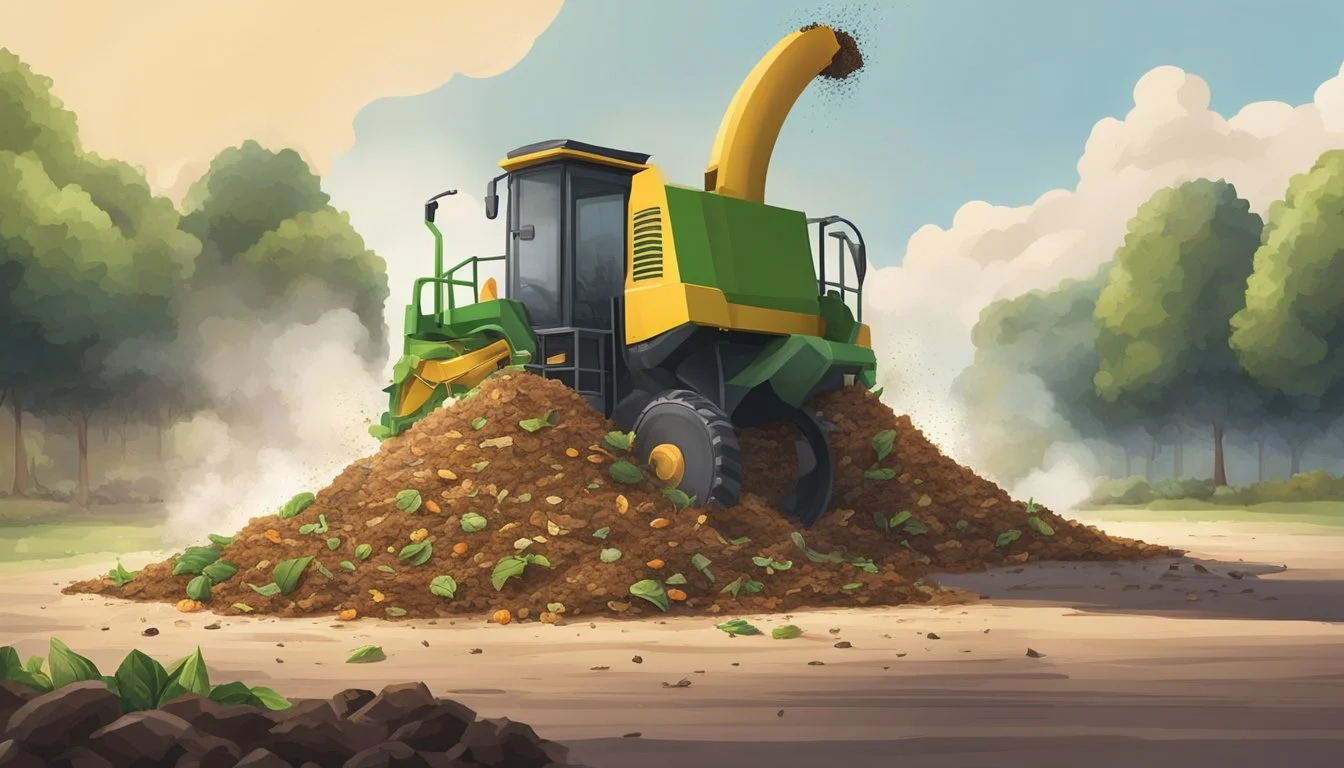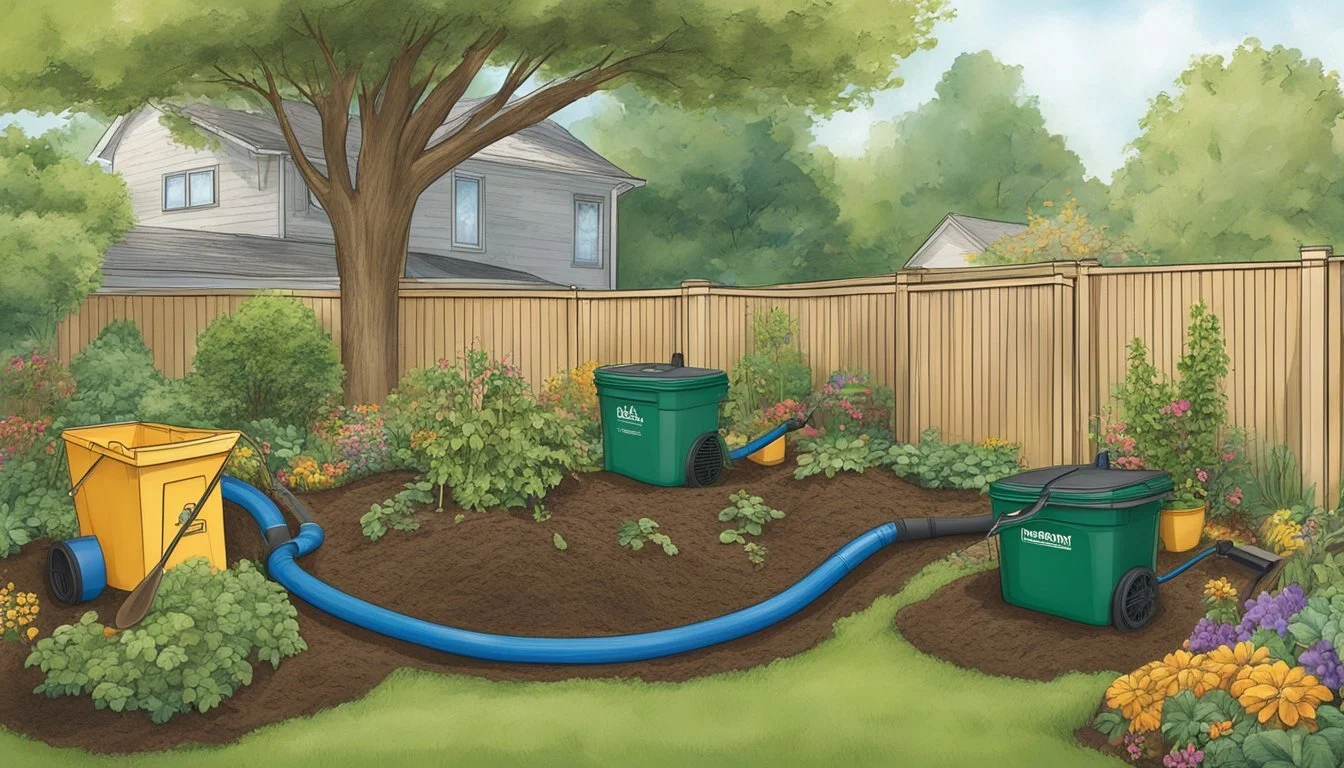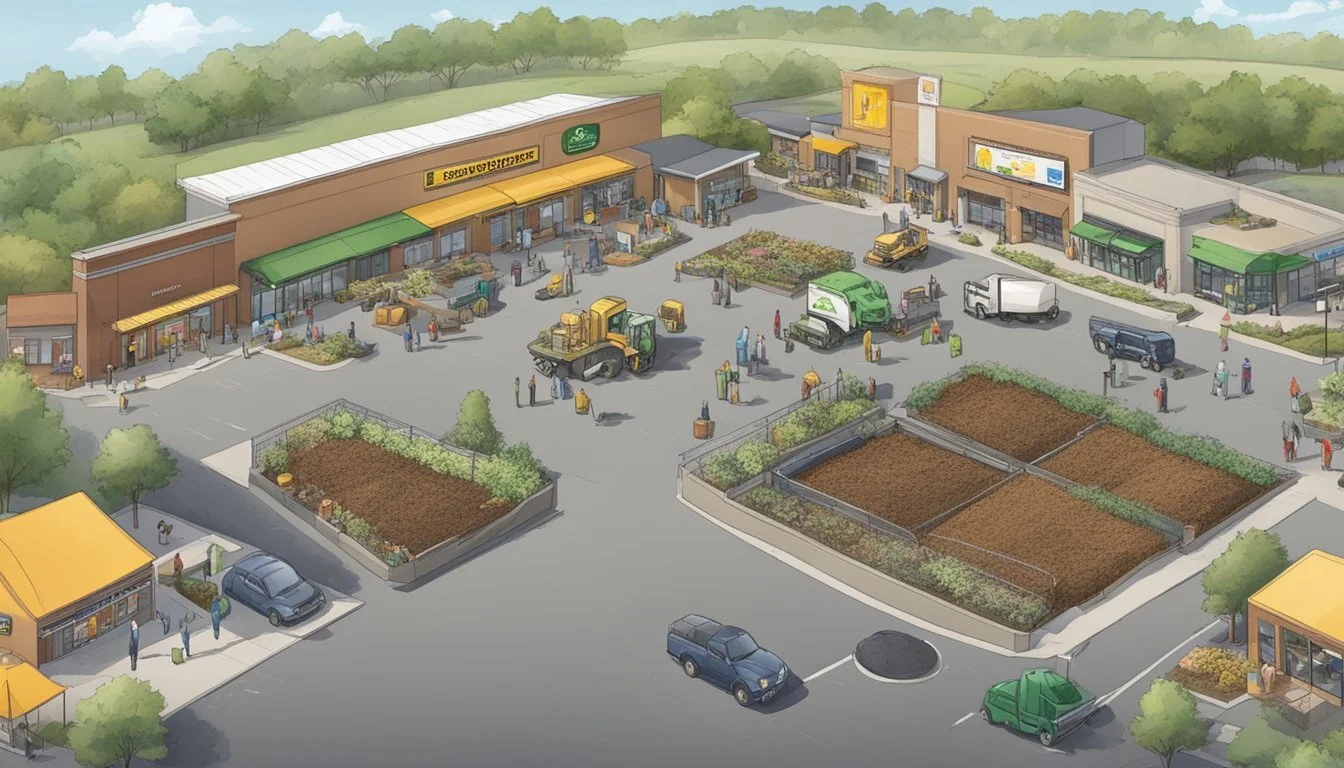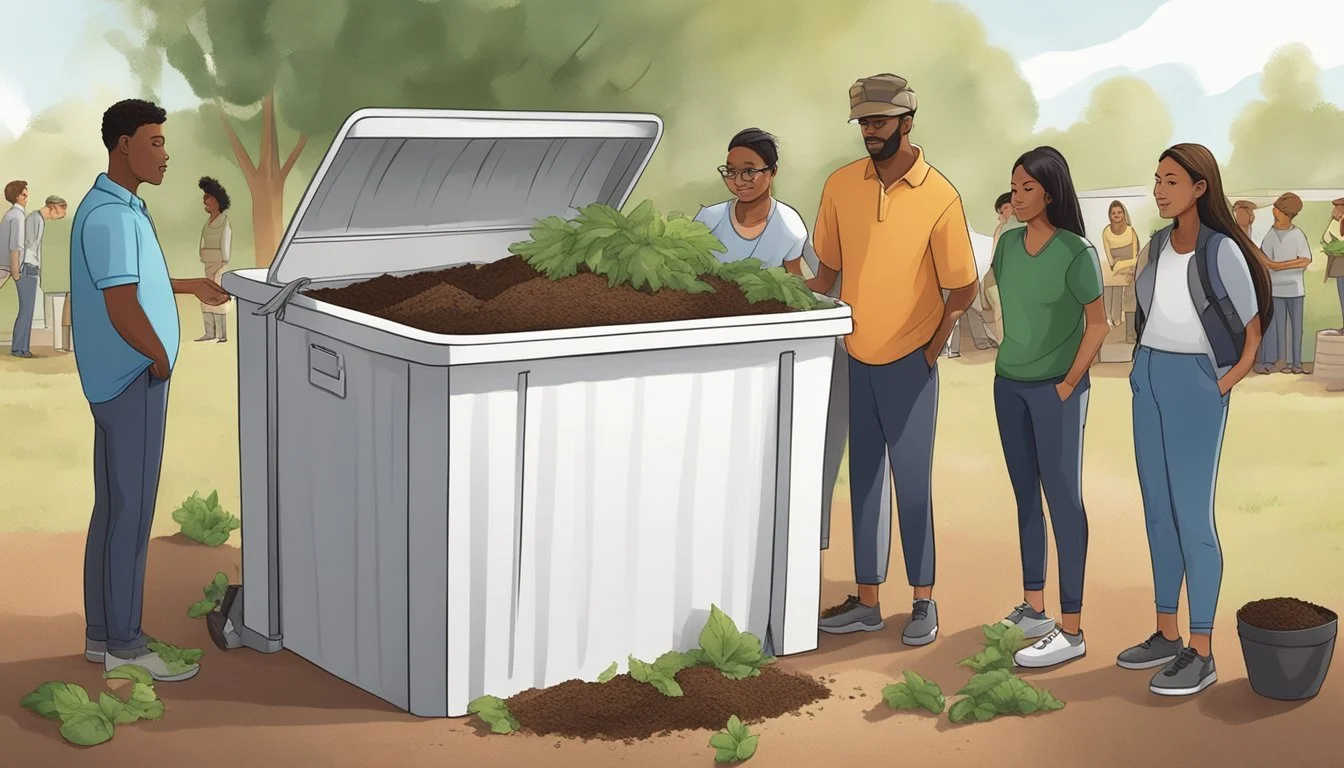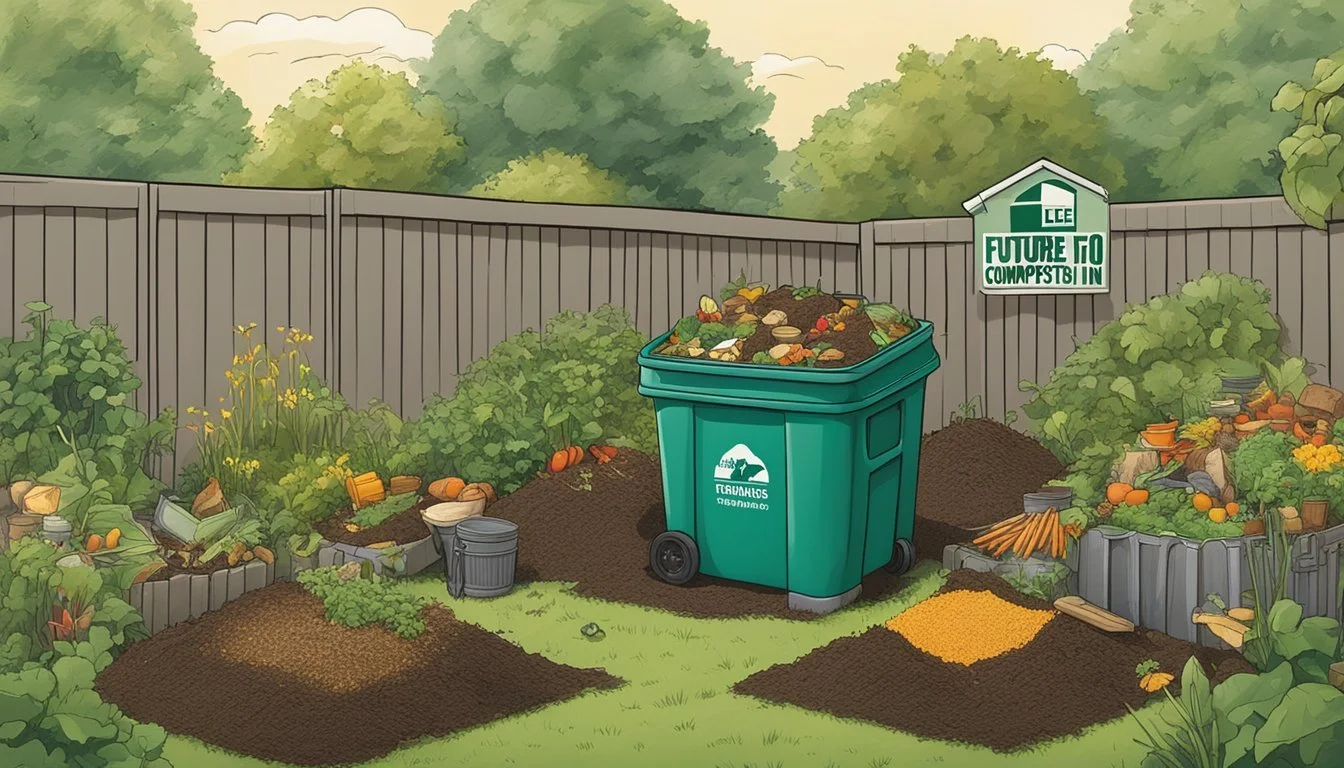Guide to Composting in Lee's Summit, MO
Essential Tips for Eco-Friendly Waste Reduction
Composting in Lee's Summit, MO, presents an eco-friendly opportunity for residents to contribute to a more sustainable environment. As a natural method of recycling organic waste, composting transforms kitchen scraps and yard debris into nutrient-rich soil amendments. In Lee's Summit, the process is supported by local initiatives and businesses that recognize the importance of composting in reducing landfill waste and enhancing soil health.
Residents have multiple resources at their fingertips to begin or improve their composting practices. Whether through learning from Missouri's Homeowner's Composting Guide or engaging with services offered by local businesses, Lee's Summit community members can easily incorporate composting into their daily lives. Missouri Organic Recycling, for instance, offers Kansas City area composting services and information on the benefits of compost for gardens and landscaping.
The city's commitment to environmental wellness is evident in the availability of composting information and resources. From drop-off locations like those affiliated with KC Can Compost to purchasing high-quality compost from specialists, Lee's Summit encourages its residents to participate in this cyclic, beneficial process. Composting not only contributes to soil fertility and plant vitality but also plays a role in protecting local landscapes against weather extremes by helping soils retain moisture.
Composting Basics
In Lee's Summit, MO, mastering composting basics can significantly benefit soil quality and garden health. Understanding the process and its advantages can lead to more efficient waste management and nutrient-rich amendments for gardening spaces.
What Is Composting?
Composting is the natural process of recycling decomposed organic materials into rich soil known as compost. It involves the breakdown of organic material by microorganisms, such as bacteria and fungi, in the presence of air and moisture. This results in a nutrient-rich substance that enhances the quality of soil. In Lee's Summit, residents can utilize this method to convert yard waste and kitchen scraps into valuable compost.
Key ingredients for successful composting include:
Greens (nitrogen sources): includes fruit and vegetable scraps, coffee grounds, and grass clippings.
Browns (carbon sources): involves dry leaves, branches, and paper products.
Benefits of Composting
The practice of composting offers extensive benefits for both the environment and homeowners in Lee's Summit:
Soil Enhancement: Compost improves soil structure, texture, and aeration. It also increases the soil's water retention capabilities.
Nutrient-Rich: Compost is a powerhouse of essential nutrients required by plants, such as nitrogen, phosphorus, and potassium. It acts as a natural fertilizer.
Waste Reduction: Composting significantly reduces the amount of waste sent to landfills by recycling organic materials that would otherwise decompose anaerobically and produce methane, a potent greenhouse gas.
By incorporating compost into their gardens, residents ensure that their plants have access to a continuous supply of valuable nutrients necessary for robust growth, thereby nurturing their piece of the earth responsibly.
Composting Guidelines in Lee's Summit
In Lee's Summit, Missouri, residents and businesses can participate in environmentally friendly waste management by following the local composting guidelines, which adhere to standards set by the City of Lee's Summit and Missouri Department of Natural Resources.
Regulations and Standards
The City of Lee's Summit enforces specific regulations to manage composting effectively within the city limits. It operates in compliance with the Missouri Department of Natural Resources to maintain ecological health. Composting services are accessible through the Lee's Summit Resource Recovery Park, where residents can dispose of yard waste and food waste during designated hours without an appointment on weekdays, and by appointment on Saturdays. For drop-offs, city sanitation recommends contacting the facility to confirm their schedule and any updates to the composting program.
Acceptable and Unacceptable Materials
Acceptable materials for composting in Lee's Summit include:
Yard waste like leaves, grass clippings, and garden plants
Food scraps, including vegetable peelings, fruit waste, and coffee grounds
Conversely, unacceptable materials that should not be added to compost bins in Lee's Summit are:
Inorganic waste or recyclables
Plastic bags or wrappers
Meat, dairy, and oily foods that can attract pests
Diseased or insect-infested plants that might contaminate the compost
Residents must sort their waste appropriately to ensure the success and environmental benefits of the local composting efforts.
Local Composting Programs
Lee's Summit, MO, is a city committed to sustainability, evidenced through its various composting programs. These initiatives are designed to reduce waste, repurpose organic materials, and engage the community through educational outreach.
Residential Composting Initiatives
In an effort to facilitate residential waste reduction, Lee's Summit has partnered with local organizations to provide accessible composting solutions to homeowners. The City of Lee's Summit supports composting by promoting programs that encourage residents to turn their yard waste into nutrient-rich soil amendments. For individuals who lack the space or ability to compost at home, there are multiple compost drop-off locations provided by initiatives like KC Can Compost, such as Bar K and Lakeside Nature Center, where residents can bring their organic waste.
Local entities like Compost Collective KC offer convenient Bin Swap Programs, ensuring that the composting process is hassle-free for the residents of Lee's Summit. These programs contribute to the city's green efforts by diverting waste from landfills and enriching the local soil.
Schools and Community Engagement
Lee's Summit places great emphasis on integrating composting into the educational system. Schools within the city are actively participating in composting programs, reinforcing the practice of sustainability among students. They partake in setting up composting systems on school grounds, teaching students about the life cycle of organic waste and its positive impact on the environment.
Moreover, community establishments like the Lee's Summit Medical Center have taken strides in reducing their environmental footprint by implementing composting practices. The city organizes workshops and programs to engage these institutions, fostering a culture of sustainability throughout the community.
By cultivating these practices, Lee's Summit demonstrates a firm commitment to environmental stewardship and community wellbeing.
Composting Facilities and Locations
Residents of Lee's Summit, MO, have access to dedicated facilities for composting yard and organic waste, contributing to sustainability efforts within the city. Two major sites offer these services: Resource Recovery Park and Kansas City Composting Services.
Resource Recovery Park
Resource Recovery Park provides a location for residents of Lee's Summit to drop off various types of waste, including yard trimmings for composting. It operates with a focus on diverting waste from landfills and turning it into beneficial products. The drop-off facility encourages the community to participate in composting and offers easy access for residents to dispose of their organic waste responsibly.
Location: 2101 SE Hamblen Rd, Lee's Summit, MO 64082
Operating Hours: Tuesday - Friday: 7:30 AM - 4:00 PM; Saturday: 7:30 AM - 3:00 PM
Kansas City Composting Services
With a comprehensive approach to organic waste management, Kansas City Composting Services supports the greater Kansas City area, including Lee's Summit. Their mission is to reduce landfill use and turn organic waste into high-quality compost and mulch.
Facilities: Operates a yard waste processing facility in Belton, MO, and a compost/waste processing facility in Lee's Summit, MO
Products: Offers a variety of soil-enhancing products such as compost and organic mulches.
Materials Recovery and Waste Management
In Lee's Summit, MO, materials recovery and waste management are essential in addressing the environmental impact of various waste streams. These processes include sorting recyclable materials, transforming organic waste into useful compost, and reducing the amount of waste sent to landfills.
Recycling
Lee's Summit plays a proactive role in recycling, allowing residents to reduce their ecological footprint. The city encourages the segregation of recyclables such as plastics, metals, paper, and glass from regular waste. Facilities like the Lee's Summit Resource Recovery Park cater to the proper handling of these materials, ensuring that they are re-processed and used in the production of new items.
Organics Recovery
The city also focuses on the recovery of organic materials, converting food waste and yard trimmings into valuable compost. Organizations and residents partake in composting efforts to mitigate the production of methane, a potent greenhouse gas, from landfills. For example, the Missouri Department of Natural Resources highlights composting as an effective method to repurpose organic waste and reduce landfill use.
Landfill Diversion
Efficient waste management strategies are in place to divert as much waste as possible from being sent to landfills. This includes not only recycling and organics recovery but also specialized disposal for materials like medical waste and household hazardous waste. The Lee's Summit Facility offers free collection services for residents to safely dispose of such waste, preventing contamination and preserving landfill space.
Products Derived from Composting
Composting in Lee's Summit transforms organic waste into valuable products that are crucial for gardening and agriculture. These products include enriched topsoil and mulch, as well as commercial fertilizers, each playing a vital role in maintaining soil health and fertility.
Topsoil and Mulch
Topsoil is the uppermost layer of soil, which contains essential nutrients from decomposed organic matter. Through the composting process, organic materials break down and contribute to the formation of a rich topsoil that improves water retention and supports robust plant growth.
Mulch, another byproduct of composting, consists of various decomposed organic materials. It serves as a protective cover for the soil, conserving moisture, minimizing weed growth, and regulating soil temperature. Residents of Lee's Summit can utilize local resources like the Missouri Organic Recycling for their mulch needs, ensuring their gardens retain moisture and fertility effectively.
Commercial Fertilizers
Commercial fertilizers derived from compost consist of concentrated nutrients that are critical for plant development. These fertilizers release nutrients slowly, ensuring a long-term benefit to plants without the risk of over-fertilization. They are created by further processing compost into a more portable and user-friendly product. The nutrient-rich compost helps create fertilizers that feed plants, improve soil structure, and enhance the soil's ability to hold water and support plant roots.
Setting Up a Home Composting System
Setting up a home composting system in Lee’s Summit, MO is a straightforward process that can reduce food waste and enrich garden soil. An efficient setup involves selecting an appropriate composter and maintaining the system through simple, practical steps.
Choosing the Right Composter
When beginning a composting venture, residents must select a composter that is suitable for their household size and the amount of food waste typically produced. In small spaces, bokashi composting or worm composting systems are effective and compact options. For more extensive operations, a traditional tumbler or bin can accommodate larger quantities of waste. Composters should be placed in an easily accessible but discreet section of outdoor space, ensuring there’s a balance of sun and shade to support decomposition. Relevant local options are listed on Yelp, where Lee's Summit residents can shop for various composting solutions.
Maintenance and Troubleshooting
Maintaining a compost system requires regular attention to:
Moisture Level:
Aim for the consistency of a damp sponge, which may require occasional watering, especially during dry spells.
Layering:
Alternate between nitrogen-rich "greens" like vegetable scraps and carbon-rich "browns" like dried leaves.
Information on proper layering techniques can be found at The Old Farmer's Almanac.
Aeration:
Turn the pile weekly with a pitchfork to oxygenate, promoting microbial activity and preventing odors.
For troubleshooting common issues such as bad smells or slow decomposition, they can assess whether their compost pile has too much or too little moisture, is lacking oxygen, or requires a better balance of greens and browns. Solutions include adjusting the moisture level, increasing aeration, or rebalancing the material types.
Composting for Businesses and Contractors
Businesses and contractors in Lee's Summit, MO have specific needs and rules when it comes to composting. This section provides a detailed overview of services offered and the guidelines that must be followed to ensure efficient and compliant composting practices.
Waste Services for Commercial Entities
Missouri Organic Recycling offers a range of compost-related services tailored for businesses in the Kansas City area, which encompasses Lee's Summit. These services are designed to assist businesses with the disposal of organic waste in an eco-friendly manner. Businesses can purchase bulk quantities of Nature Wise Compost for their landscaping needs at competitive contractor prices.
Contractors and companies may also access yard waste drop-off points for the disposal of organic materials. It's important for businesses to be aware that there may be additional fees for certain waste services, depending on the quantity and type of organic waste being handled.
Contractor Guidelines and Requirements
Contractors must adhere to specific guidelines and requirements to participate in composting programs. First, they need to sort organic waste correctly to avoid contamination which can undermine the composting process. They are required to follow local regulations concerning waste sorting and processing.
Contractors must also take note of size limitations; for example, Missouri Organic Recycling specifies that their Nature Wise Compost product is available in a 5/8 minus size. Understanding such specifications helps in choosing suitable compost products for various projects.
It is advisable for contractors to reach out directly to composting facilities like KC Composting for more detailed information on products and a comprehensive list of guidelines to ensure compliance with local regulations.
Composting Events and Workshops
In Lee’s Summit, composting enthusiasts and beginners alike have access to a variety of events and workshops that promote sustainable waste management. The region benefits from the expertise of local organizations dedicated to spreading the word about composting.
The Compost Collective KC operates with a mission to educate the public and provides composting services in Kansas City since 2017. They offer talks and resources tailored for diverse groups, from schools to businesses, to promote a greener community.
Residents can also attend free composting workshops hosted by entities like Less Is More, where attendees learn how yard waste and food scraps transform into plant food. The workshops cater to a range of expertise levels, from backyard beginners to composting veterans.
Location Event Type Hours of Operation Kansas City Educational Programs Varies, check website Shawnee Curbside Composting Service Varies, check website Mission Private Composting Workshops Varies, check website Belton Composting Resource Sharing Varies, check website
For those near Kansas City, MO, or across the state line in KS, these workshops provide a practical approach to composting with expert guidance. Whether in Shawnee, Mission, or Belton, the proximity of these events to Lee's Summit allows for convenient learning opportunities.
In addition to scheduled events, the Missouri Department of Natural Resources offers informational resources and can be contacted for details about composting within the state. They can guide on best practices and how to get started with composting at home.
Residents are encouraged to participate in these local composting events and workshops to not only dispose of waste responsibly but also contribute towards a healthier environment for the entire Lee's Summit community.
Future of Composting in Lee's Summit
Composting in Lee's Summit, MO, is set to transform as innovative technologies and heightened community awareness converge to position the city as a leader in sustainable waste management.
Innovations in Composting Technology
Advances in composting technology promise to streamline processes and improve efficiency for Lee's Summit residents. Future facilities might employ aerated static pile composting, which utilizes a system of pipes to introduce air into the compost pile, enhancing decomposition while minimizing odor. There is also potential for integrating in-vessel composting systems, where organic waste is placed in a drum, silo, or similar container to rapidly break it down. Such technologies are being considered to manage and repurpose the city's organic waste more effectively, potentially reducing the need for traditional landfills, as concerns regarding a potential landfill have been raised by homeowners.
Community and Environmental Impact
The environmental impact of an evolved composting program in Lee's Summit can be substantial. Residents will have the opportunity to greatly reduce their waste footprint, leading to less landfill use and lower methane emissions, a potent greenhouse gas. Community composting initiatives encourage citizens to partake in sustainable practices, fostering a sense of collective responsibility toward the local ecosystem. Lee's Summit's investment in education and composting infrastructure signals a future where waste is not just discarded, but repurposed to enrich the soil and support Missouri's agriculture. The community's historical dedication to green initiatives suggests that the future of composting in Lee's Summit will only strengthen the bond between the city and its commitment to the environment.





